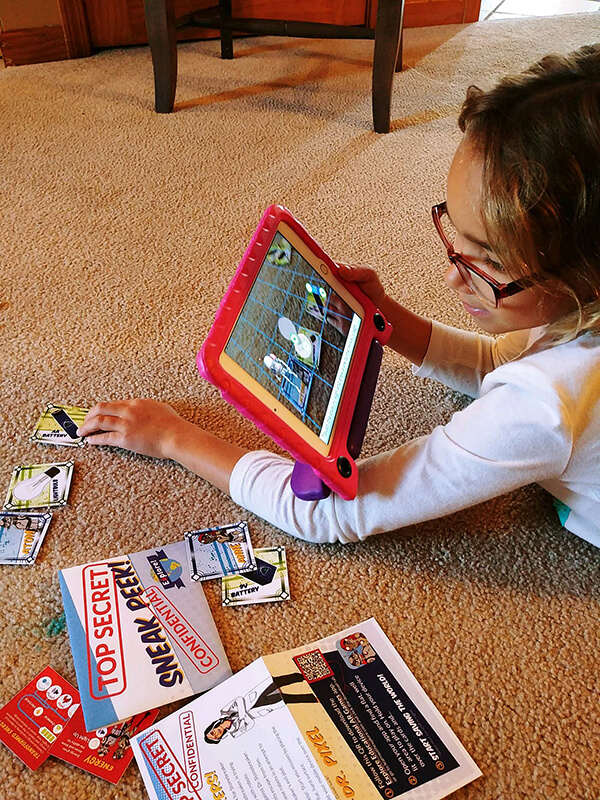July 11, 2019
$275,000 in grants to boost augmented reality platform that helps students learn STEM concepts
 Miranda Thompson plays with Explore Interactive’s Sneak Peek Kit, which includes a sample of three early circuit games and a set of Explore Interactive Augmented reality cards. Explore Interactive has received grants totaling $275,000 to further develop its platform.
Download image
Miranda Thompson plays with Explore Interactive’s Sneak Peek Kit, which includes a sample of three early circuit games and a set of Explore Interactive Augmented reality cards. Explore Interactive has received grants totaling $275,000 to further develop its platform.
Download image
WEST LAFAYETTE, Ind. – A Purdue University-affiliated startup developing a platform using augmented reality to encourage students to learn about science, technology, engineering and mathematics (STEM) has received grants totaling $275,000. The technology enables children to experience hands-on science through gameplay.
Explore Interactive received a $225,000 Small Business Innovation Research Grant from the National Science Foundation and a $50,000 grant from Elevate Ventures, an Indiana-based venture development organization that supports the development and success of entrepreneurs across the state. The grant funds development work in collaboration with HitPoint Studios and educational research with researchers at the INSPIRE Research Institute for Pre-College Engineering at Purdue University.
Amanda Thompson, CEO of Explore Interactive, said the grant money will be used to make the augmented reality platform collaborative between devices so up to four children can work together with each using their own smart device camera. It allows students to learn from and with each other.
“Collaborative augmented reality is one of the most innovative things happening in education,” Thompson said. “It allows teachers to challenge students to work together to troubleshoot and solve problems. The potential topics are limitless.”
Thompson said the system can be adapted using Explore Interactive cards for a wide variety of sciences, from building circuits, to learning about biological systems to exploring ecosystems to physics. When viewed through a tablet, the cards appear to have a 3D light bulb and battery, that children can use to build or solve problems. These 3D objects superimposed into the real world are created with the augmented reality technology.
“Elementary school-age children can’t work with a Bunsen burner, but with augmented reality they can turn on a Bunsen burner and boil water and see how water reacts and changes,” Thompson said. “Future development will allow them to zoom in to the molecular level and see the atoms heating up and moving apart from each other.”
A study published by the International Journal of Science Education shows that children who are involved with STEM by the time they are adolescents are more likely to pursue a career in those areas as adults, and people in those careers earn higher wages, according to the National Association of Colleges and Employers. Thompson said having a platform being developed by Explore Interactive could make it easier on teachers to provide regular hands-on STEM activities. As technology becomes integrated into the classroom, educators have access to more learning resources. But all those different applications can make it challenging for teachers.
“It’s taxing on the teachers to have to learn so many applications,” Thompson said. “Our idea is that Explore Interactive would be a consistent platform where teachers could access all various hands-on lessons, almost like an augmented reality encyclopedia of experiences to learn how the world fits together.”
Purdue research, led by Monica Cardella, an associate professor of engineering education and executive director of INSPIRE, and Sean Brophy, an associate professor in the School of Engineering Education, will test the prototype on late elementary age students. Parents interested in signing their students up to participate in this study should contact Brophy at sbrophy@purdue.edu. Explore Interactive plans to conduct classroom testing in the spring of 2020 and begin making its program widely available to educators for the start of the 2020-21 school year.
Explore Interactive has received support and guidance from the Purdue Foundry, a commercialization accelerator in Purdue University’s Burton D. Morgan Center for Entrepreneurship.
Explore Interactive technology aligns with Purdue's Giant Leaps celebration of the university’s global advancements made in health, space, artificial intelligence and sustainability as part of Purdue’s 150th anniversary. Those are the four themes of the yearlong celebration’s Ideas Festival, designed to showcase Purdue as an intellectual center solving real-world issues.
About Purdue Foundry
The Purdue Foundry is an entrepreneurship and commercialization accelerator in Discovery Park's Burton D. Morgan Center for Entrepreneurship whose professionals help Purdue innovators create startups. Managed by the Purdue Research Foundation, the Purdue Foundry was co-named a top recipient at the 2016 Innovation and Economic Prosperity Universities Designation and Awards Program by the Association of Public and Land-grant Universities for its work in entrepreneurship. For more information about funding and investment opportunities in startups based on a Purdue innovation, contact the Purdue Foundry at foundry@prf.org.
About the National Science Foundation's Small Business Programs
America’s Seed Fund powered by NSF awards $200 million annually to startups and small businesses, transforming scientific discovery into products and services with commercial and societal impact. Startups working across almost all areas of science and technology can receive up to $1.5 million in non-dilutive funds to support research and development (R&D), helping de-risk technology for commercial success. America’s Seed Fund is congressionally mandated through the Small Business Innovation Research (SBIR) program. The NSF is an independent federal agency with a budget of about $8.1 billion that supports fundamental research and education across all fields of science and engineering.
Writer: Nicole Pitti, njpitti@prf.org
Purdue Research Foundation contact: Tom Coyne, 765-588-1044, tjcoyne@prf.org
Source: Amanda Thompson, athompson@exploresupport.com

